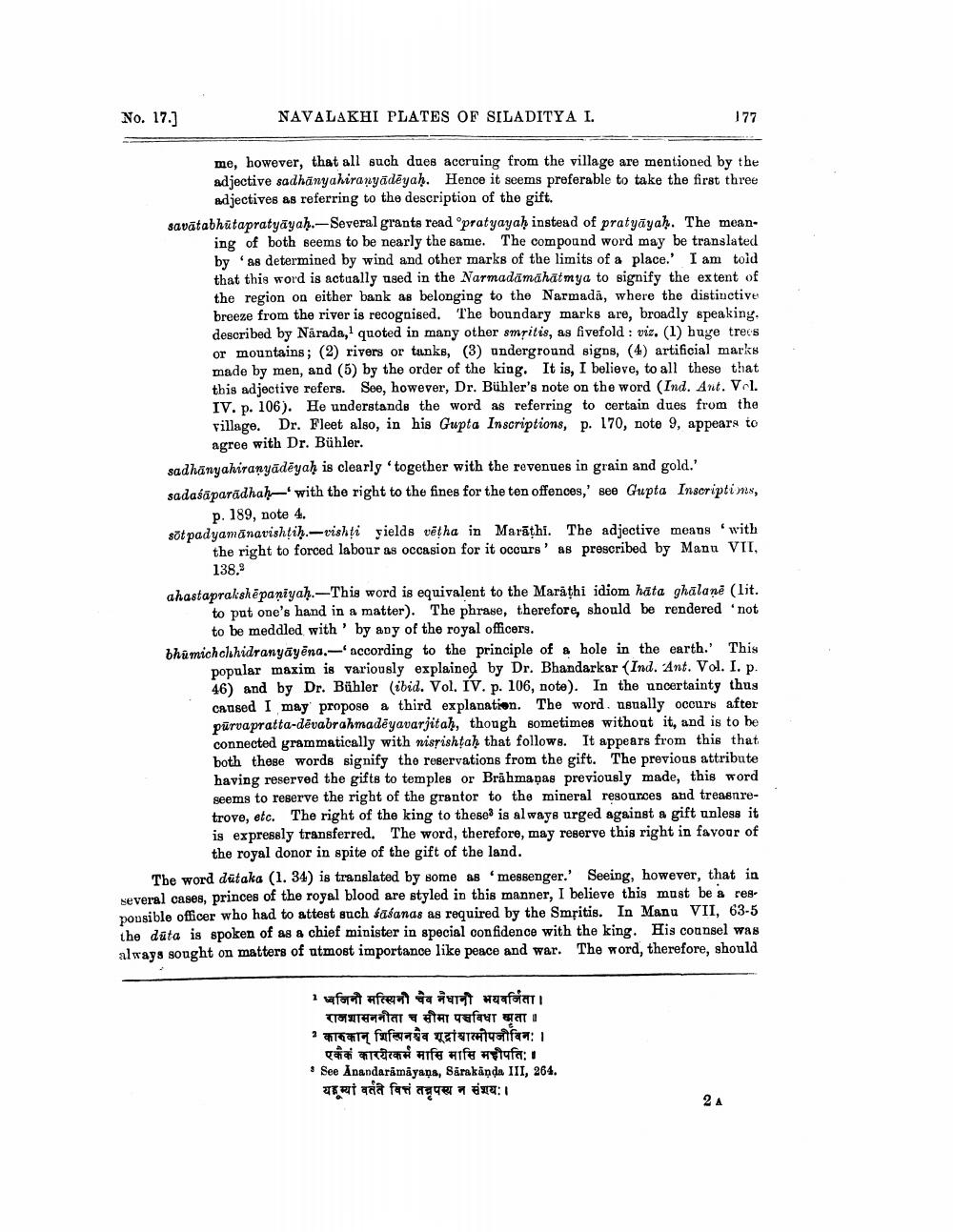________________
No. 17.]
NAVALAKHI PLATES OF SILADITYA I.
177
me, however, that all such dues accruing from the village are mentioned by the adjective sadhanyahiranyad@yah. Hence it seems preferable to take the first three
adjectives as referring to the description of the gift. savātabhūtapratyāyah-Several grants read opratyayah instead of pratyāyah. The mean
ing of both seems to be nearly the same. The compound word may be translated by as determined by wind and other marks of the limits of a place. I am toid that this word is actually used in the Narmadamahatmya to signify the extent of the region on either bank as belonging to the Narmada, where the distinctive breeze from the river is recognised. The boundary marks are, broadly speaking. described by Nárada, quoted in many other smțitis, as fivefold : viz. (1) huge trees or mountains; (2) rivers or tanks, (3) underground signs, (4) artificial marks made by men, and (5) by the order of the king. It is, I believe, to all these that this adjective refers. See, however, Dr. Bühler's note on the word (Ind. Ant. Vol. IV. p. 106). He understands the word as referring to certain dues from the Fillage. Dr. Fleet also, in his Gupta Inscriptions, p. 170, note 9, appears to
agree with Dr. Bühler. sadhanyahiranyādēyah is clearly together with the revenues in grain and gold.' sadašāparādhah— with the right to the fines for the ten offences,' see Gupta Inscriptis,
p. 189, note 4. sot padyamānarishtih.-rishti yields vētha in Marāthi. The adjective means with
the right to forced labour as occasion for it occurs' as prescribed by Manu VII,
138.
ahastaprakshēpaniyah. - This word is equivalent to the Marathi idiom häta ghālane (lit.
to put one's hand in a matter). The phrase, therefore, should be rendered 'not
to be meddled with' by any of the royal officers. bhimichchhidranyayēna.-'according to the principle of a hole in the earth. This
popular maxim is variously explained by Dr. Bhandarkar (Ind. Ant. Vol. I. p. 46) and by Dr. Bühler (ibid. Vol. IV. p. 106, note). In the uncertainty thus caused I may propose a third explanation. The word. usually occurs after pūrvapratta-dēvabrahmad@yavarjitaḥ, though sometimes without it, and is to be connected grammatically with nisrishtah that follows. It appears from this that both these words signify the reservations from the gift. The previous attribute having reserved the gifts to temples or Brāhmaṇas previously made, this word seems to reserve the right of the grantor to the mineral resources and treasnretrove, etc. The right of the king to these is always urged against a gift unless it is expressly transferred. The word, therefore, may reserve this right in favour of
the royal donor in spite of the gift of the land. The word dataka (1. 34) is translated by some as 'messenger.' Seeing, however, that in several cases, princes of the royal blood are styled in this manner, I believe this must be a res. pousible officer who had to attest such fasanas as required by the Smritis. In Manu VII, 63-5 The data is spoken of as a chief minister in special confidence with the king. His counsel was always sought on matters of utmost importance like peace and war. The word, therefore, should
ध्वजिनौ मत्स्यिनी चैव नधानी भयवर्जिता।
राजशासननीता च सीमा पञ्चविधा स्मृता । 1 161fafa atefon:
एकैकं कारयेत्कर्म मासि मासि महीपतिः । • See Anandarimayaņs, Särakanda III, 264. यह म्यां वर्तते वित्तं तनृपस्य न संशयः ।




